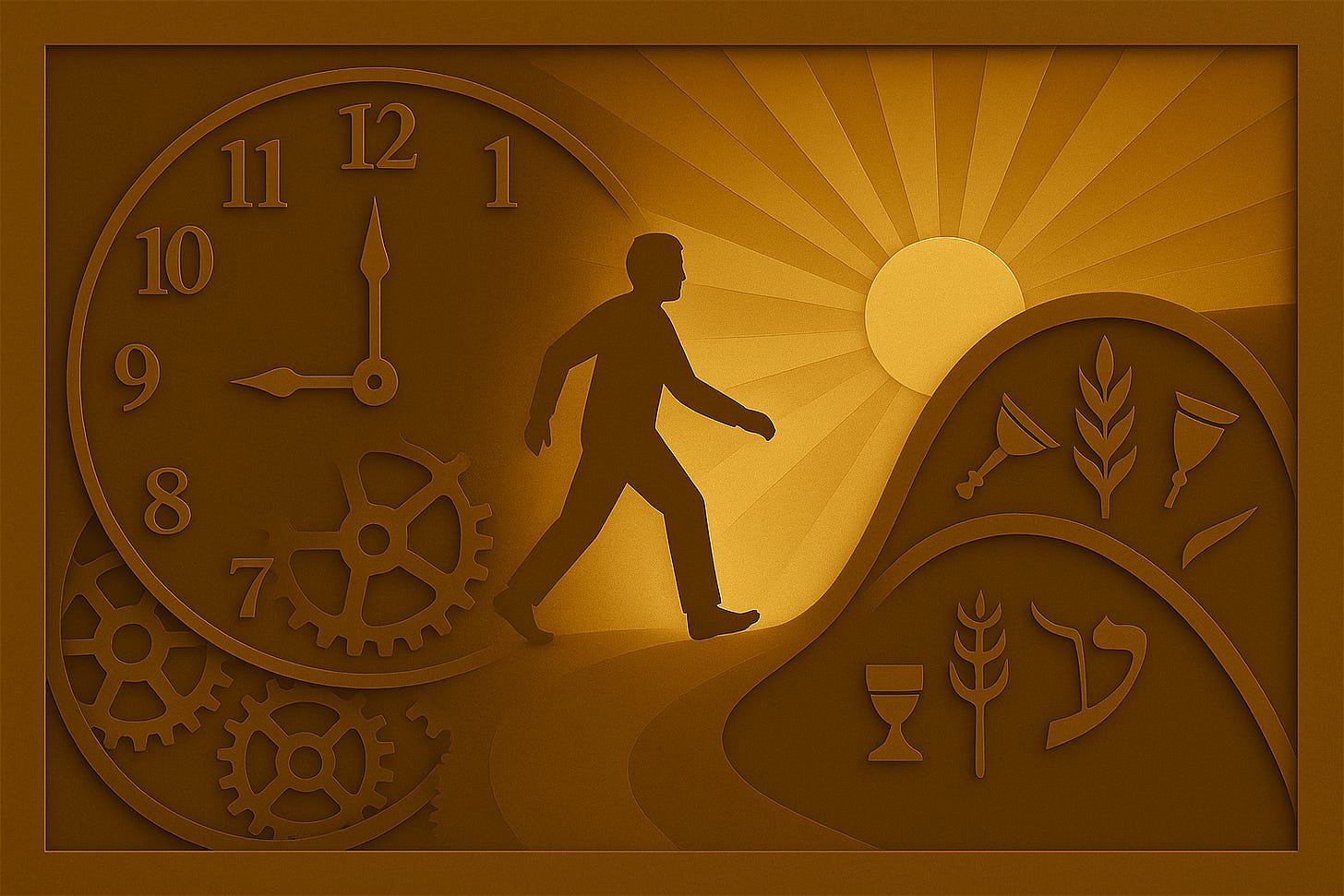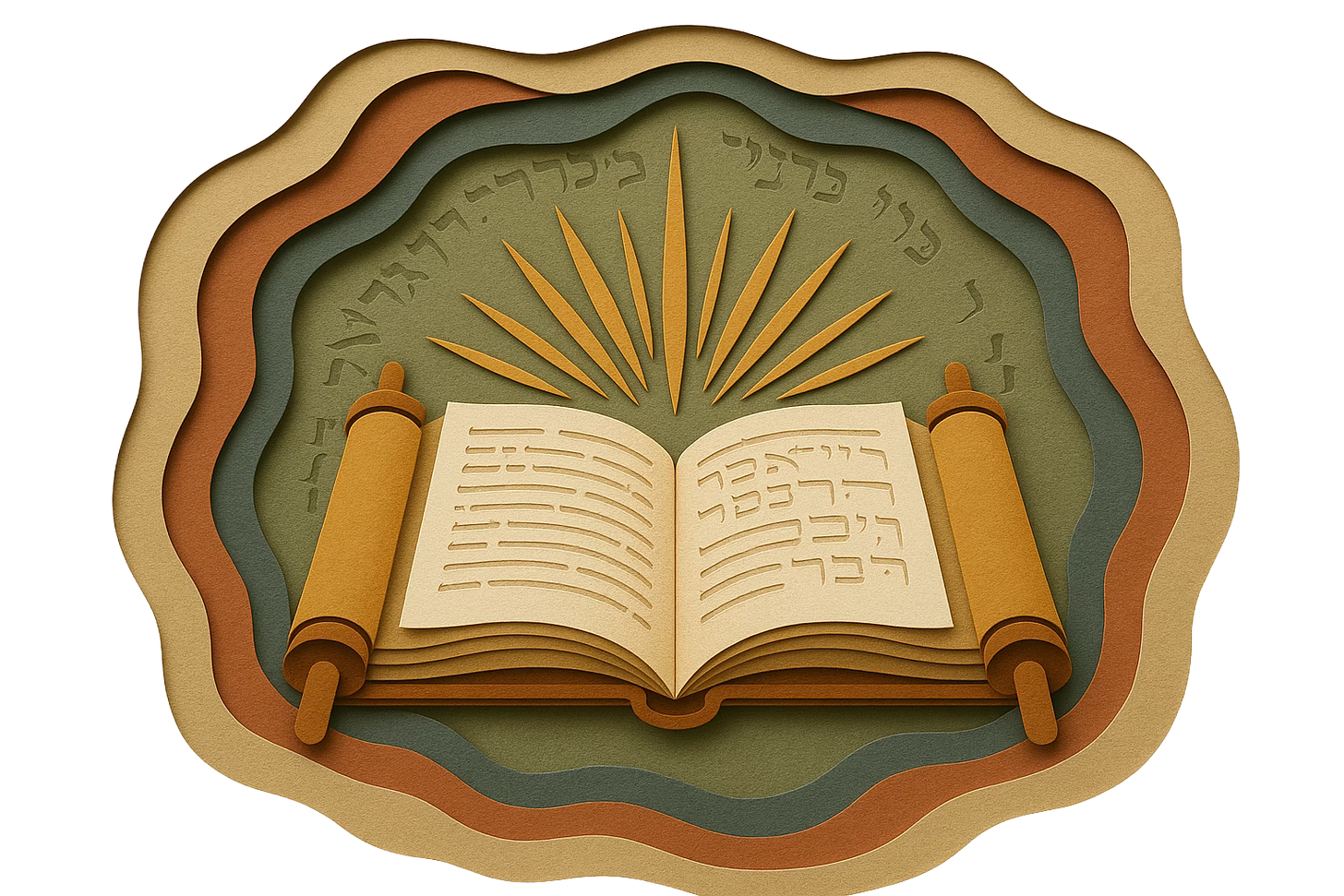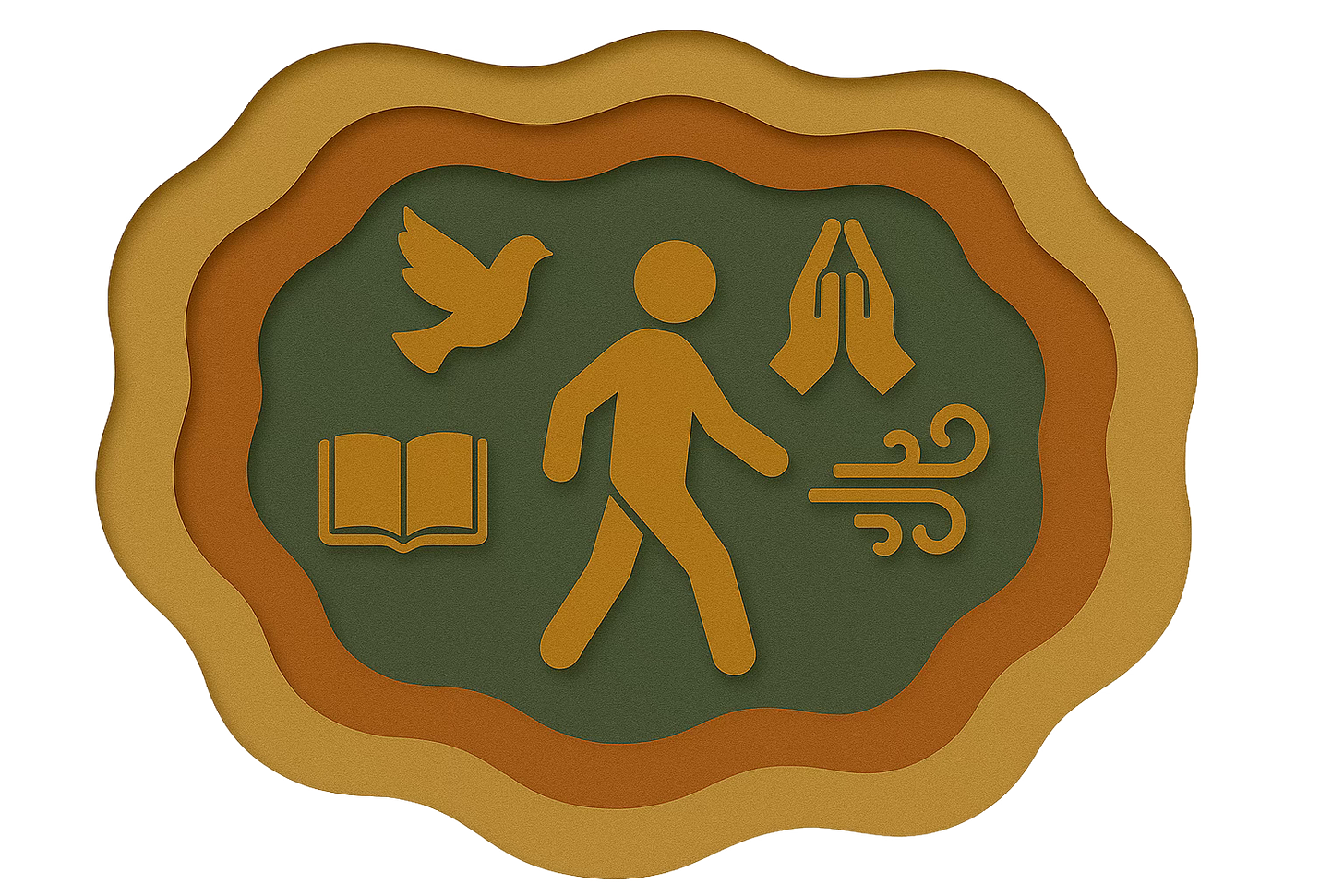Redeeming the Rhythm
Walking in Kairos, Resisting Chronos
Scripture: The Living Word
Time is one of the first things Yah created — but in Scripture, time is never merely a clock. It is covenantal space where the Eternal meets the created.
Two Greek words describe it: chronos and kairos.
Chronos (χρόνος) is measurable time — minutes, hours, years — the passing sequence of events. It’s where humanity builds schedules, empires, and calendars.
Kairos (καιρός) is appointed time — sacred opportunity, the moment Yah steps in with purpose. It is time pregnant with meaning, the meeting point between heaven’s rhythm and earth’s movement.
The Hebrew mind would hear kairos and think of moed (מוֹעֵד) — Yah’s appointed times, the moments He declares holy in His calendar.
From the first chapter of Genesis, Yah filled creation with these rhythms:
“Let them be for signs and for appointed times (moedim), and for days and years.”
— Genesis 1:14
Time, then, is not ours to keep — it is His to reveal.
When we live by chronos alone, we count days but miss meaning.
When we live by kairos, we discern the divine appointments hidden inside each moment.
Paul understood this distinction deeply. Writing to the believers in Ephesus — a community shaped by Roman commerce and imperial calendars — he warned them not to be swept up in chronos, the ceaseless march of worldly time.
He called them back to kairos, to Yah’s rhythm of wisdom and purpose.
“So then, be careful how you walk—not as unwise but as wise,
redeeming the time (kairos), because the days are evil.
Therefore do not be foolish, but understand what the will of the Lord is.”
— Ephesians 5:15–17
Paul’s language carries covenant echoes. The word he uses for “redeem” (exagorazō) means to buy back — to reclaim something enslaved.
He’s not simply saying “use your time well.” He’s urging the ekklesia to buy back Yah’s appointed moments from the grip of an evil age that distorts time for profit, power, and control.
Ephesians unfolds this rhythm of redemption from beginning to end:
“He made known to us the mystery of His will… to unite all things in Messiah at the fullness of time (pleroma tou kairos).”
— Ephesians 1:9–10
Messiah came in perfect kairos — not early, not late — and now calls His people to walk in that same divine timing.
Paul’s exhortation in chapter 5 is an invitation to live inside Yah’s clock again — where Sabbath, feast, and Spirit all teach the same lesson:
Time is holy when it belongs to Him.
To redeem the kairos is to remember whose time we’re living in.
Context: Behind the Words
The Epistle to the Ephesians is not merely a theological treatise but a spiritual formation manual for believers living inside empire. Written by Paul around A.D. 60, it maps how the redeemed community should live heaven’s order amid Rome’s disorder.
From its opening line —
“He chose us in Him before the foundation of the world…” — Ephesians 1:4
— to its climactic hope,
“to unite all things in Messiah at the fullness of time (pleroma tou kairos).” — Ephesians 1:10
Paul paints a vision of redeemed rhythm: a people who walk according to kairos — Yah’s appointed time — not chronos, the empire’s mechanical one.
By chapter five, Paul’s warning becomes pointed:
“Be careful how you walk, not as unwise but as wise, redeeming the time (kairos), because the days are evil.” — Ephesians 5:15–16
He’s not offering moral advice about time management. He’s calling the ekklesia to reclaim Yah’s rhythm from a culture enslaved to empire’s clock.
1. The World Paul Was Writing Into
Ephesus lived by Rome’s calendar — market days, imperial festivals, and the seven-day planetary week:
Sunday (dies Solis, Sun), Monday (dies Lunae, Moon), Tuesday (dies Martis, Mars), Wednesday (dies Mercurii, Mercury), Thursday (dies Jovis, Jupiter), Friday (dies Veneris, Venus), and Saturday (dies Saturni, Saturn).
Even the months bore Roman names: January (Janus), February (Februa), March (Mars), April (Aphrodite/Venus), May (Maia), June (Juno), July and August (Julius and Augustus).
When Paul said “the days are evil,” he was describing not only moral decay but a colonized calendar — time itself submitted to idols.
2. From Ephesus to Empire
Paul’s words proved prophetic. Within two centuries, Rome rewrote time.
After Jerusalem’s destruction in A.D. 70 and the Bar Kochba revolt in A.D. 132–135, Jewish observance became criminalized.
Gentile Christians, eager to avoid persecution, distanced themselves from anything deemed “Jewish” — Sabbath, feasts, dietary rhythms — the very covenant markers Yah gave His people.
By the third century, the church’s calendar no longer reflected Sinai but Caesar.
In A.D. 321, Emperor Constantine issued the Sunday law, commanding all citizens to rest “on the venerable day of the Sun.”
It was not revelation but religious consolidation — aligning worship with the empire’s most popular deity, Sol Invictus, the Unconquered Sun.
A generation later, the Council of Laodicea (A.D. 363–364) forbade Sabbath observance altogether, branding it “Judaizing.”
The result: the seventh-day rest of creation was replaced with the first-day festival of the sun. Chronos had conquered kairos.
3. The Death and Birth of the Unconquered Sun
Around the time of the winter solstice (December 22–25), ancient observers watched the sun reach its lowest point in the sky, appearing to “die” for three days before beginning its ascent again on the 25th — the return of light.
In A.D. 274, Emperor Aurelian elevated the Roman solar cult and declared Dies Natalis Solis Invicti — “Birthday of the Unconquered Sun.”
This festival honored Sol Invictus, the empire’s supreme deity, uniting Rome’s many faiths under one radiant symbol of power.
Over time, the 25th of December became a civil celebration of renewal — the day the unconquered sun returned to conquer darkness.
Scholars have long noted that this date appears in the Chronograph of 354 A.D. as the first recorded Christian feast of Messiah’s birth in Rome around A.D. 336, only decades after Constantine’s rule.
See How December 25 Became Christmas (Biblical Archaeology Society).
Many historians interpret this as Christianization of a pagan festival — a rebranding of the birth of the sun as the birth of the Son.
Others suggest that early theologians simply calculated Yeshua’s conception on March 25 (the believed date of His crucifixion), making His birth nine months later on December 25.
For the alternate view, see Is Christmas a Pagan Rip-off? (The Gospel Coalition).
Regardless of its origin, the outcome is clear: imperial power re-timed sacred remembrance. What began as covenant rhythm — the moedim of Yah’s appointed times — was gradually replaced by a new rhythm of empire.
When Constantine merged imperial religion with Christianity, the festival was not abolished but absorbed. The light of Sol Invictus was recast as the light of Christ, but the calendar still beat to Rome’s pulse.
As centuries passed, the biblical feast cycle dimmed beneath the imperial liturgical year: Passover gave way to Easter, Shavuot to Pentecost Sunday, Sukkot to autumn church festivals.
What Yah designed as covenant rhythm became ceremonial routine — holy time turned to holiday, and sacred rhythm surrendered to schedule.
4. The Naming of Time
Rome didn’t stop at holidays — it renamed days and months themselves to secure allegiance.
Each day honored a planetary god; each month, a deity or emperor.
By naming time, Rome claimed to own it.
Paul’s phrase “the days are evil” becomes literal — the days themselves bore the names of idols.
5. The Rise of Chronos Religion
Over centuries, the faith that began as a rhythm of covenant became a religion of the clock.
Holiness shifted from time to place — from Sabbath to sanctuary.
Faith became an event instead of a walk.
The sacred rhythm of Yah’s calendar gave way to bureaucratic precision.
Chronos religion counts attendance; kairos relationship counts alignment.
One lives by the empire’s efficiency; the other listens for heaven’s timing.
6. Redeeming the Kairos
Yet even amid empire, Yah’s rhythm endures.
The earliest believers called themselves The Way (Acts 9:2) because they lived by it — keeping Sabbath, celebrating the feasts, and walking in step with the Ruach.
Yeshua fulfilled these appointed times perfectly: crucified at Passover, raised at Firstfruits, Spirit poured out at Shavuot.
He did not abolish the calendar — He embodied it.
To redeem the kairos is to return to that heartbeat — to align our steps with Yah’s appointed rhythm, where rest is worship, obedience is timing, and every moment becomes meeting space between Creator and creation.
Today, as in Paul’s day, the “evil” is not only immorality — it is mechanical living:
time monetized, worship industrialized, rest minimized.
To redeem the kairos is to resist that tyranny — to let Yah’s rhythm reclaim our calendars, homes, and hearts.
When we rest when He rests and move when He moves, we declare that Caesar no longer owns our time.
Christianity became a religion of chronos;
The Way remains a life of kairos.
One measures time.
The other meets Yah in it.
Covenant: The Relational Core
In Scripture, Yah’s first holy thing was not a temple or a mountain — it was time.
Before there was a priest, an altar, or a nation, there was a rhythm: six days of work, one day of rest.
Time itself became the meeting place between Creator and creation.
“And God blessed the seventh day and made it holy,
because on it God rested from all His work that He had done in creation.”
— Genesis 2:3
The Sabbath was not an end to activity; it was the beginning of intimacy.
To rest in Yah’s rhythm was to dwell in His covenant — to know His time, His pulse, His peace.
1. Time as Covenant Relationship
Every covenant carries a rhythm of remembrance: Yah acts, His people respond, and together they rehearse redemption through sacred time.
When Yah delivered Israel from Egypt, He did not only give them a law — He gave them a calendar.
“These are My appointed times (moedim), the appointed times of the Lord, holy convocations which you shall proclaim at their appointed seasons.”
— Leviticus 23:2
The Hebrew word moed (מוֹעֵד) means appointed meeting — a divinely scheduled encounter.
In Aramaic, the word zeman carries the same idea: an appointed occasion filled with meaning.
Yah’s calendar was His covenant clock, calling His people into rhythm with His redemptive plan.
Each Sabbath, feast, and year of release reminded Israel of a deeper truth: time belongs to Yah.
When Paul urges the ekklesia to “redeem the kairos,” he is summoning them back to this relationship.
Chronos counts minutes; kairos counts moments of communion.
2. The Pattern of Yah’s Rhythm
Yah’s covenants move in a threefold pulse:
Creation — Command — Communion.
In Creation, time was blessed.
In Sinai, time was structured.
In Messiah, time was redeemed.
Each rhythm leads to rest:
Sabbath: rest from labor.
Sabbatical year: rest for the land.
Jubilee: rest for the oppressed.
Kingdom: eternal rest in His presence.
Yah’s rhythm is not static but cyclical — work, worship, release, renewal — training His people to live by His tempo rather than their own.
This is why the prophets equated rebellion with being out of rhythm:
“This is the way; walk in it.” — Isaiah 30:21
“Stand by the roads, and look, and ask for the ancient paths… and you will find rest for your souls.” — Jeremiah 6:16
Covenant faithfulness has always been about timing — knowing when to move, when to wait, and when to rest.
3. What Was Lost When Time Was Rewritten
When the ekklesia surrendered Yah’s calendar for Rome’s, something deeper than dates was lost — relationship.
The shift from kairos to chronos replaced intimacy with efficiency.
The Sabbath — once a day of delight — became a debate.
Feasts — once encounters with Yah’s presence — became festivals of empire.
Rest turned into ritual.
Remembrance turned into routine.
Faith began to measure itself by attendance, not alignment.
Worship became punctual, but no longer prophetic.
In trying to fit Yah’s people into the empire’s clock, the church traded the covenantal rhythm of heaven for the industrial rhythm of earth.
This is what Paul foresaw when he warned, “The days are evil.”
He wasn’t condemning hours on a clock — he was lamenting a world that had lost its rhythm with God.
4. The Call to Redeem the Kairos
The Greek verb exagorazō — “redeem” — literally means to buy back from slavery.
Paul’s command, then, is covenantal: purchase time out of bondage.
Rescue it from being ruled by systems that ignore Yah’s heartbeat.
Redeeming time is not about better scheduling — it’s about better surrendering.
It’s learning to live within Yah’s moedim again:
Sabbath rest that realigns our souls.
Feasts that remind us of His promises.
Seasons that shape us for His purposes.
Yah’s calendar is not law; it is love structured through time.
It is how heaven teaches earth to breathe.
5. The Covenant Heartbeat Restored
Yeshua declared Himself “Lord of the Sabbath” not to abolish rest but to restore its meaning.
He healed on that day because healing was its purpose.
He fulfilled every feast because He was their fulfillment.
He moved perfectly in step with Yah’s kairos, showing us what covenant rhythm looks like in human form
Through His Spirit, that same rhythm lives in us.
We are no longer bound by chronos — anxious striving, constant measuring, endless motion — but invited into kairos: a life attuned to the Father’s timing.
To walk by the Spirit is to live in sync with Yah’s heartbeat again.
The Sabbath becomes more than a command; it becomes communion.
The moedim become more than memorials; they become meetings.
And every day becomes sacred when it is lived in step with His rhythm.
Covenant summary:
Yah sanctified time so His people could live in fellowship, not frenzy.
The enemy seeks to enslave time through systems, schedules, and empire.
The gospel restores time to its original purpose: to dwell with Yah in rhythm and rest.
Practice: Living It Out
Modern Example: Redeeming the Morning and the Week
Most of us wake up to a screen before we wake up to the Spirit.
The light that first touches our eyes isn’t dawn — it’s data.
Before our feet touch the floor, chronos has already claimed us: the emails, the notifications, the calendar invites, the alerts that whisper, “You’re already behind.”
That’s how the empire keeps time — through urgency.
It trains us to measure the day before we’ve received it as a gift.
And over time, the rhythm of chronos becomes our religion: always producing, always proving, always performing.
But Yah’s rhythm begins differently.
He starts with rest — “and there was evening and there was morning, the first day.”
Before work, there was worship. Before production, presence.
The Hebrew day begins when the sun sets, not when the alarm rings — because Yah wants us to begin in rest, not rush.
Now bring that into the modern week.
The world’s calendar ends on Friday with exhaustion and begins on Monday with anxiety.
But Yah’s rhythm ends with peace and begins with worship.
When you honor the Sabbath — not as a ritual but as relationship — you are resisting empire and reclaiming Eden.
To silence the phone, to stop the scroll, to walk away from the inbox — even for one day — is to declare:
“My worth is not in my productivity; my peace is not for sale.”
That is how we redeem the kairos — by reclaiming time from the tyranny of chronos.
Every morning becomes an altar.
Every Sabbath becomes a rebellion.
And in both, the soul learns again to breathe in Yah’s rhythm.
Three Takeaways
Time is Holy
Yah sanctified time before He sanctified anything else.
Every moment can become a meeting when we see it as His.
Redeeming kairos means treating time as sacred space.Rest is Warfare
Rest is not laziness — it is loyalty.
When you rest in Yah’s rhythm, you break agreement with the world’s demand to perform.
True Sabbath living dethrones anxiety and enthrones trust.Rhythm is Relationship
You can’t walk with Yah if you’re marching to empire’s tempo.
Rhythm requires awareness — slowing down enough to hear the Spirit’s pulse and align your steps with it.
Three Discussion Questions
Where in your life has chronos — hurry, productivity, pressure — replaced kairos?
What might it look like to “redeem the time” in your home, work, or worship rhythm?
How does viewing Sabbath and rest as covenantal rather than ceremonial change your perspective on following Yeshua?
Seven-Day Practice Rhythm
Day 1 — 🪞 For Yourself: Identify the Noise
Name one area of your life where you feel out of rhythm — overscheduled, restless, or hurried.
Ask the Ruach to show what’s driving that pace.
Day 2 — 🤝 For Others: Make Room for Presence
Cancel or postpone one unnecessary commitment this week.
Use that time to simply be present with someone you love — no agenda, no rush.
Day 3 — 🙏 With Yah: Observe a Holy Hour
Choose one uninterrupted hour for stillness.
Put away your phone, clock, and notifications.
Let your soul breathe and listen for His timing.
Day 4 — 🪞 For Yourself: Reorder Your Week
Plan the next seven days around rest first, not last.
Let the Sabbath — however you keep it — be the center, not the leftover.
Day 5 — 🤝 For Others: Share the Rhythm
Invite a friend or family member to share a meal that honors rest — no distractions, no screens, just gratitude.
Discuss what peace feels like when time slows down.
Day 6 — 🙏 With Yah: Align Your Seasons
Reflect on your current season of life.
Ask Yah what He’s emphasizing — sowing, waiting, pruning, or harvesting — and choose one action that matches His timing.
Day 7 — 🕊 Sabbath Rest: Return to the Groove
Stop striving.
Worship slowly.
Rest intentionally.
Let your body and spirit recalibrate to heaven’s pulse.
Breathe this prayer:
“Teach us to number our days,
that we may gain a heart of wisdom.” — Psalm 90:12
Closing Blessing
May the noise of the world grow dim and the rhythm of heaven grow near.
May your heart keep time with Yah’s heartbeat.
When others hurry, may you rest.
When others drift, may you dwell.
May each sunrise become an invitation,
each Sabbath a rehearsal,
and each moment a meeting.
You were not made for chronos —
you were made for kairos.
Walk in rhythm with the Ruach,
and find rest for your soul.






